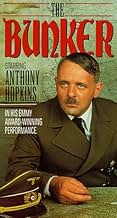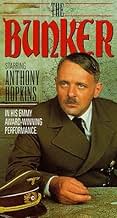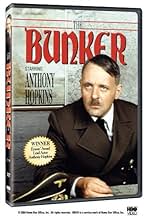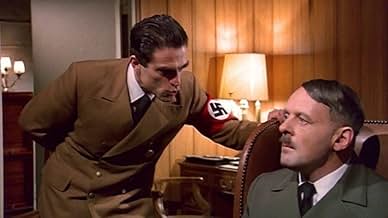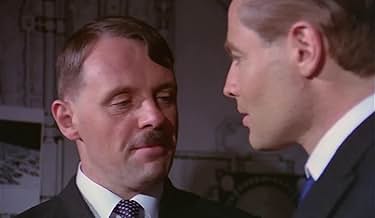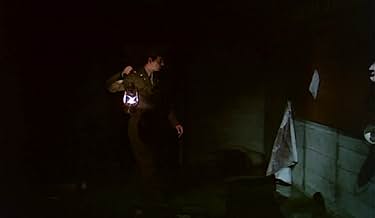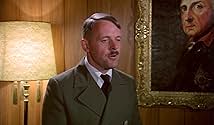Füge eine Handlung in deiner Sprache hinzuDramatization depicting the events surrounding Adolf Hitler's (Sir Anthony Hopkins) last weeks in and around his underground bunker in Berlin before and during the battle for the city.Dramatization depicting the events surrounding Adolf Hitler's (Sir Anthony Hopkins) last weeks in and around his underground bunker in Berlin before and during the battle for the city.Dramatization depicting the events surrounding Adolf Hitler's (Sir Anthony Hopkins) last weeks in and around his underground bunker in Berlin before and during the battle for the city.
- Regie
- Drehbuch
- Hauptbesetzung
- 1 Primetime Emmy gewonnen
- 1 Gewinn & 2 Nominierungen insgesamt
- Gard SS #1
- (as George Chorafas)
Empfohlene Bewertungen
The picture is correctly based on real events, adding more details , the deeds happened of the following manner : ¨Fuehererbunker¨(Leader's Bunker)is the subterranean headquarter below the Chancellery and its garden in Berlin where Hitler (Anthony Hopkins) spent his last days, from April 20 to 30, 1945. It was constructed during WW2 some 50 feet below the ground. It could be reached through the New Chancellery by descending a stairway from the butler's pantry. There were two levels, On the upper level was a dining passage separating six rooms on each side. At the end of the central passage a curved stair led down to Hitler's own deeper bunker. This area had seventeen rooms , all small, cramped , and uncomfortable : Hitler's suite of three rooms, a map room used for conferences, the dressing room and bedroom of Eva Braun(Susan Blakely), the bedroom of Dr Paul Joseph Goebbles(Cliff Gorman) and wife(Piper Laurie),the rooms of Dr Ludwig, lavatories and bathrooms, an emergency telephone exchange, a drawing room, guardroom, cloakroom and a dog bunker for Hitler's Alsatian bitch named Blondi, with her four puppies. Hitler spent hours before giant war maps, shifting colored pins about to locate units that no longer existed. By this time he was in a state of extreme nervous exhaustion : although only fifty-six, he moved as if he were prematurely senile. His health grew even worse the ministrations of his doctors(Frank Gatliff, Morris Perry). With the exception of Goebbles and Martin Bormann(Michael Londsdale), his secretaries and several others, his lieutenants began to desert him. He denounced Herrmann Goering(David King)for trying to usurp his leadership and Heimrich Himmler (Michael Sheard) for seeking to negotiate with the count Bernadotte and Allied. Albert Speer (Richard Jordan) his minister of Armaments and War Production , refused to carry out his orders for a scorched-earth policy. At last acknowledge defeat, the Fuehrer decided to leave the world in a gesture of Wagnerian self-immolation. In the early hours of April 29, 1945, he married Eva and immediately afterward dictated his last will and political testament, in which he justified his life and work. The next day he retreated into his suite and shot himself while Eva took poison to end her life. In accordance with his instructions, the bodies were dumped into a trough in the Chencellery garden,doused with gasoline and burned. From April 22 to May 1, 1945 , the following were present in the Bunker: Gen Keitel(John Paul), Gen. Hans Guderian(Brain Villa) , Col.Von Below(Julian fellows), Gen. Alfred Jodl(Steedman) , Major Gen. Rattenhuber(David Swift), Lieutenant Genen Fegelein (Terrence Hardiman), Dr. Ludwig Stumpfegger , among others.
Anthony Hopkins gives the finest portrayal of a living dead man that I've seen. There have been numerous other version, documentary and fictionalized, and some are fine productions but they don't achieve parity. Alec Guiness, for instance, gave us a Hitler who was annoyed by the disintegration of his armies and his plans, an exasperated leader who acts as if the automobile he's just bought is a lemon and not covered by a warantee. Luther Adler showed us a bitter madman. But Hopkins is modulated, quiet, quietly disturbed, his right hand trembling after the attempt on his life the year before. Hopkins' Hitler can no longer raise his injured right arm high enough to give the full salute. It's a stunningly precise and believable portrait. Suspicious, but not a raging paranoid. And under stress he lets loose a startling hiss. It's not surprising that Hopkins does such a good job in the role. He was my co-star in the superior "Road to Wellville" and I gave him a few pointers that helped him over the rough spots. He seemed put out when I charged him ten cents for the tutoring.
The central conflict here is between Hopkins and Albert Speer, his Minister of Arms and War Production. Speer was a brilliant architect and industrialist, a relatively young handsome officer played here by Richard Jordan. Hitler was fond of Speer, considering both of them -- the architect and the erstwhile painter -- to be artists. But now Hitler has issued orders that all of Germany be destroyed before the Allies get to Berlin. Speer objects. Hitler is adamant. Speer develops a plan to introduce poison gas into the vent that supplies air to the underground bunker, which will kill everyone inside, including Hitler. But after the last assassination attempt, Hitler has become double wary and self protective. The plan is dropped and Speer remarks that he'll not try another because "I think I only had one in me." Speer decides instead to agree to the destruction of Germany but will prevent it by bureaucratic stalling and by wrapping the process in red tape.
There are scenes between Hopkins and Jordan that are truly touching. Speer was perhaps Hitler's favorite among his staff. "My good architect; my GENIUS architect." Now Speer is telling him frankly that the war is lost. Well, nobody else is telling der Fürher that the war is lost. They know better, because the penalty for acting on that belief is death. But Hopkins BEGS Jordan for some sign of faith. Okay, Jordan believes the war is lost. But does he have faith in ME? Does he at least have HOPE? "Even THAT would satisfy me." Jordan is desolate and Hopkins is near tears as he implores his friend to give some positive response. It's like watching the tragic breakup of a love affair or a marriage. It seems impossible but Hopkins brings humanity to the most inhumane human being of his century. I can imagine the outcries against a portrait of Hitler that isn't a stereotype.
To make matters worse, we see him flirting with Susan Blakely as his mistress, Eva Braun. But if the viewer needs the usual clichés, they're available in occasional dissolves followed by flashbacks to better times, when Hitler and Speer first met, before Germany became a sewer, before the death factories began to churn out their product. But history is inexorable. As Berlin is encircled, desperate attempts are made to get out, to avoid the vengeful Russians by surrendering to Eisenhower in the west. The atmosphere in the littered and unguarded bunker itself follows secretary Traudl Junge's description -- the men on the remaining staff dance and carouse with the women and drink themselves into a stupor. It was a big party. The party atmosphere was enhanced by the mockery of a marriage between Hitler and Eva Braun. "Do you swear that you are of pure Aryan descent and free of hereditary diseases?" It's impossible not to be moved as the end approaches and Josef Goebbels invites his staff to a farewell party. The camera lingers on the faces of his children, some barely old enough to sing the heroic song, and all of whom he and his wife Magda will shortly kill by cyanide poisoning.
There have been a number of films about Hitler's last days, both feature films and documentaries. This is one of the best. Let's hope it's also the last. Who wants to watch a long, slow suicide?
Wusstest du schon
- WissenswertesAfter viewing the dailies, one of the producers complained that Anthony Hopkins' portrayal of Adolf Hitler was too sympathetic. Hopkins replied that his portrayal was based on the premise that ultimately even Hitler was also human, and that's what's so horrific about him.
- PatzerAt the very end of the movie, the SS man/switchboard operator, Misch is seen talking to mechanic Hentschel while preparing to flee "The Bunker". The rifle Misch has shouldered is a Russian Mosin Nagant; he would have been carrying the German Mauser of which plenty would have been available with all the wounded in the proximity. It's unlikely anyone would have taken a Russian weapon down into Hitler's Bunker.
- Zitate
Albert Speer: The war is lost.
Adolf Hitler: [shouting] The war is not lost! The war is not lost! The war will never be lost! We're gonna beat'em, we're gonna beat'em all!
- VerbindungenFeatured in The 33rd Annual Primetime Emmy Awards (1981)

